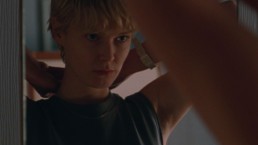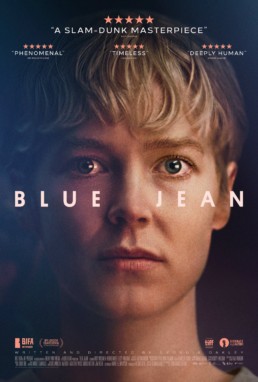Blue Jean
Blue Jean is a confident and resonating drama about one woman's desperation to safeguard herself when her livelihood is threatened.
We’re halfway through 2023 and I can confidently say that writer/director Georgia Oakley’s Blue Jean has a snug place on my forthcoming list of favorite films of the year. This indie gem–winner of the Venice Film Festival’s People’s Choice Award and four British Independent Film Awards–is not only a confident directorial debut, but an achingly resonating drama about one woman’s desperation to safeguard herself when her livelihood is threatened.
In a phenomenal lead performance by BIFA-winning actress Rosy McEwen, Blue Jean captures the life of a closeted queer woman living against the backdrop of Margaret Thatcher’s conservative England. The year is 1988 and P.E. teacher Jean (McEwen) rounds up her squirrely class of high schoolers to discuss the day’s topic: fight or flight. Honing in on the fact that one doesn’t decide how to react, but rather this instinct is innate and unique to each of us, Jean soon faces her own fight or flight dilemma. Mounting political pressure from the right pushes a new law, Section 28, into the forefront of conversation among her colleagues, who are unaware of Jean’s sexuality. The law, which is equivalent to Florida’s “Don’t Say Gay’ bill, prohibits the “promotion of homosexuality” by local authorities, essentially intimidating all queer men and women into silence.
As the prospect of living under this proposed government regime infiltrates Jean’s mind, her girlfriend, Paula (Lainey Shaw) is someone who doesn’t seem too affected. With a shaved head, piercings, and a leather vest to complement her motorcycle, Paula is the definition of a woman who is not interested in anyone’s opinion. This confidence scares Jean, who finds herself downplaying their relationship when out in public or caught off guard.
Jean’s hidden secret is further challenged when a new student enrolls in her class. 15-year-old Lois (Lucy Halliday) is unlike the other girls, she keeps to herself and doesn’t care to assimilate into the school environment. One night, at the gay nightclub Jean and her group of friends frequent often, Jean spots Lois at the bar. Terrified that Lois may out her, Jean is quick to realize that she needs to be very cautious about how she approaches Lois from here on out. It’s a delicate dance between teacher and student, which culminates into a crescendo in the film’s final act.
Blue Jean is a stunning and meticulously beautiful feature debut from Georgia Oakley. A debut like this feels few and far between, creating a sense of both wonderment and disbelief that such talent has been discovered. Much in the same way that Charlotte Wells’ Aftersun stunned audiences with its unexpected greatness, Blue Jean deserves the same attention.
The film grain adds a layer of visual aesthetic that radiates a warm and lived-in quality. Cinematographer Victor Seguin captures a saturated moody England, playing to the shades of blue and all-over desperation of the situation. Equally as impressive as the cinematic choreography is the score by composer Chris Roe (listen to the Blue Jean OST here). The melodic scales he traverses throughout the gentle, ambient score make the music feel alive, like living art.
Blue Jean is a modern-day masterpiece, an astounding feat by all involved. Its entry into the queer cinema canon is a welcomed addition, and its impact will no doubt resonate with all who watch.
Distributed by Magnolia Pictures. Now playing in select Los Angeles theaters.
Morgan Rojas
Certified fresh. For disclosure purposes, Morgan currently runs PR at PRETTYBIRD and Ventureland.


